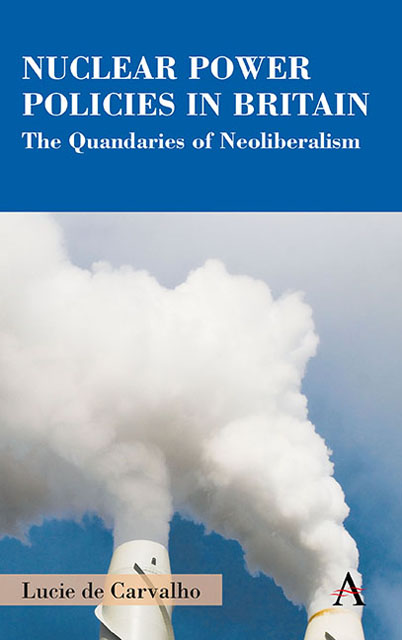Chapter Two - The Discursive (De)politicisation of Nuclear Power
Published online by Cambridge University Press: 10 January 2023
Summary
The scientific understanding of risks pertaining to technological activities has fundamentally reshaped interactions between science and politics, knowledge and power in contemporary Western societies. These transformations have been particularly acute for nuclear power in the sense that the dangers intrinsic to this technology, that is, explosions, leaks, low or high-level radioactive pollution, military proliferation and radioactive waste management, can potentially bear dramatic and irreversible consequences. These have upset the time and space parameters traditionally applied to assess the scope of industrial accidents. The zero-risk bias has long been discarded for nuclear and most modern industrial technologies. Already in 1953, American physicist Edward Teller, one of the pioneers of nuclear physics, contributed to shattering the then widespread myth of technical omnipotence, by contending that absolute safety was not possible, and that all a scientist could do was to mitigate nuclear hazards by predicting them through probability and containing them to the most minimum risk. By stating that uncertainty remains a fundamental component of all nuclear technologies, thereby highlighting the limits of scientific certainties, Teller flagged the key notions of choice, compromise and acceptability.
Political justification resting on an officially sanctioned rationale is a key component of public policy agenda-setting, just as the construction of legitimate knowledge is all too essential in good governance. Yet, in democratic systems, political decisions to initiate, restart or cancel a nuclear programme can no longer be unilaterally adopted based on scientific experts’ opinions alone, nor on the premise that their allegedly rational knowledge must be the bedrock of an ideal societal development. Political concertation and negotiations on acceptable technological choices are now premised on risk/benefit calculations and bargaining over utility, usability and acceptability. As Nielsen predicated, technological acceptability is two-fold: it has both a practical (based on costs, reliability, utility and yield capability), and a social dimension. This latter point is crucial for nuclear debates. Since nuclear decisions reflect societal development choices, they are weighed against key guiding value principles, which go beyond mere economic, political or event technical parameters. Similarly, the very notion of risk has been approached as a socio-cultural process, resting on both objective and rational arguments but also value-laden moral sentiments and perceptions which embody the ethical scope of energy choices.
- Type
- Chapter
- Information
- Nuclear Power Policies in BritainThe Quandaries of Neoliberalism, pp. 51 - 78Publisher: Anthem PressPrint publication year: 2022

